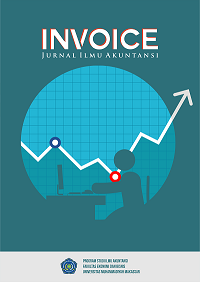EVALUASI SISTEM AKUNTANSI MANAJEMEN TERHADAP KELANCARAN PROSES PRODUKSI PADA PT. SEMEN BOSOWA
DOI:
https://doi.org/10.26618/inv.v2i1.3182Abstract
This study aims to determine how the influence of management accounting system evaluation on the smooth process of cement production at PT. Semen Bosowa Maros. This type of research used in this research is descriptive method. Data collection techniques using observation and interviews. The results showed that PT Semen Bosowa Maros had done this well because the Management Accounting System Evaluation was carried out systematically and structured starting from the time of production planning, production process control and performance coordination. and in the annual production of PT Semen Bosowa from 2014 to 2018 decreased as an adjustment to the level of cost realization which also increased in that year.
References
Ahmad, K. (2014). In D.-d. K. Keputusan, Akuntansi Manajemen (Edisi 3 ed., p. 3). Jakarta: Rajawali Pers.
Harti Budiyanti, d. (2013). In M. P. Manajemen, & R. Brontolaras (Ed.), Akuntansi Manajemen (Edisi 2 ed., p. 1.9). Tanggerang Selatan: Universitas Terbuka.
Ira Rahmawati, Y. R., & Nurleli. (2017). Pengaruh Karakteristik Sistem Akuntansi Manajemen Terhadap Kinerja Manajerial Dengan Ketidakpastian Lingkungan Sebagai Variabel Moderating. Prosiding Akuntansi, 3(2), 93-100.
Janrilius Doli Butarbutar, H. K. (2017). Analisis Penerapan Sistem Akuntansi Manajemen Terhadap Kualitas Produk Di PT. Empat Saudara Manado. Jurnal Riset Akuntansi Going Concern, 12(1), 187-193.
Kurnia, D. (2015). Analisis Sistem Akuntansi Manajemen Pada Perusahaan Manufaktur Di Kabupaten Serang Implikasinya Pada Kelangsungan Hidup Perusahaan. Jurnal Akuntansi, 2(1), 86-102.
Majid, J. (2013). Akuntansi Manajemen. In R. D. Ayu (Ed.), Memahami Akuntansi Manajemen (p. 2). Makassar: Alauddin University Press.
Nadia Lanny Tengor, V. I., & Tirayoh, V. Z. (2016). Pengaruh Sistem Akuntansi Manajemen Terhadap Pengendalian Biaya Kualitas Produk Pada CV. Sarana Marine Fiberglass Manado. Jurnal Emba, 4(1), 272-282.
Puspitawati, L., & Anggadani, S. D. (2011). Sistem Informasi Akuntansi. In Sistem Informasi Akuntansi (p. 57). Yogyakarta: Graha Ilmu.
Sugiyono. (2017 ). Metode Penelitian. In Kuantitatif, Kualitatif, R&D (p. 224). Bandung: ALFABETA.
Sujarweni, V. W. (2015). Akuntansi Manajemen. In A. Manajemen, Teori & Aplikasi (p. 5). Yogyakarta: Pustaka Baru Press Yogyakarta.
Sunyoto, D. (2016). Metodologi Penelitian Akuntansi. Bandung: PT Refika Aditama.
Sutisman, E., & Putra, G. H. (2017). Pengaruh Sistem Akuntansi Manajemen Terhadap Kinerja Produksi Pada PT. X. Jurnal Future, 4(2), 198-214.
Yuliana, & Friyani, R. (2017). Pengaruh Karakteristik Sistem Akuntansi Manajemen Terhadap Kinerja Manajerial Dengan Desentralisasi Dan Locus of Control Sebagai Variabel Moderasi Pada Perusahaan Manufaktur Di kota Jambi. Jurnal Sains Sosio Humaniora, 1(2), 149-155.
Downloads
Published
Issue
Section
License
Authors who publish with Invoice: Jurnal Ilmu Akuntansi agree to the following terms:
Copyright Ownership
The copyright of all articles published in this journal remains with the author(s). However, the authors grant Invoice: Jurnal Ilmu Akuntansi the right of first publication with the work simultaneously licensed under a Creative Commons Attribution 4.0 International License (CC BY 4.0). This license allows others to share, copy, redistribute, adapt, and build upon the work for any purpose, even commercially, as long as proper credit is given to the original author(s) and the source.Licensing and Access
Invoice: Jurnal Ilmu Akuntansi provides immediate open access to its content on the principle that making research freely available to the public supports a greater global exchange of knowledge. All published materials are available freely without subscription or payment and can be accessed, downloaded, and reused by any user provided that appropriate attribution is given.Permission for Reuse
For uses not covered by the CC BY 4.0 license, such as commercial reprints, translations, or any form of adaptation without clear attribution, users must obtain written permission from the editorial team. Requests for such permissions can be directed to the editorial office at: [insert journal email here].Plagiarism and Originality
Authors are responsible for the originality of their submissions. All articles are screened for plagiarism using appropriate tools before acceptance. Manuscripts found to contain unoriginal content or infringing materials will be rejected or retracted as per journal policy.

